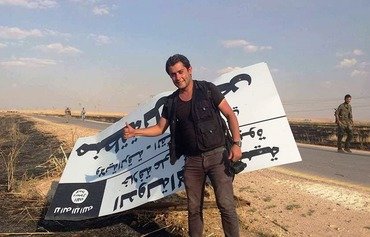The "Islamic State of Iraq and the Levant" (ISIL) continues to suppress media freedoms by cracking down on journalists and media activists inside and outside Syria, experts and media activists told Diyaruna.
ISIL seeks vengeance against media activists who expose the truth about the group and the falsity of its claims, they said, noting that its suppression of journalists is part of its efforts to fully isolate the areas under its control.
These measures are designed to block news from these areas from reaching the outside world and also to prevent trapped residents from accessing the news, they said -- particularly news of the battles the group is losing.
Some recent examples of ISIL's tactics against journalists include a June 26th video titled "Inspirations of Satan", in which ISIL executed five Syrian media activists in Deir Ezzor it had accused of "apostasy" for spreading "false news" about ISIL.
On June 13th, Syrian journalist Ahmed Abd al-Qader survived a stabbing in the Turkish city of Urfa after receiving several threats via social media prior to the attack. It was the second attempt on his life in three months. ISIL claimed the assassination attempt through its news agency, Amaq.
ISIL had previously claimed responsibility for the killing of Abd al-Qader’s brother, Ibrahim, and his colleague Fares Hamadi, in October 2015.
Suppressing news
"ISIL continues to crack down on journalists and media activists for two reasons," said Cairo University faculty of media professor Hassan Afifi.
The first is revenge, he told Diyaruna, while the second is to silence them.
The group seeks vengeance against journalists "for exposing the group and unveiling the crimes it is committing in Syrian areas under its control", he said.
These include executions, amputations and flogging under the pretext of implementing sharia, he said, adding that journalists also shed light on the deterioration of living conditions, scarcity of jobs and fees imposed by ISIL.
Any media activist who is hostile to the group is silenced through assassination, he said, "forcing some activists to suspend their activity to preserve their lives".
After receiving direct death threats, many journalists and media activists have had no option but to escape Syria or suspend their media activity altogether, Afifi said.
ISIL started cracking down on journalists and media activists as soon as it began imposing its control in Syria, said Syrian activist Mahmoud Omar, a member of the Syrian Network for Human Rights who is currently in Turkey.
The group accused them of being "apostates and working with infidels to fight and bring down the Islamist state project", he told Diyaruna. "This put journalists and media activists, and even humanitarian activists, at risk of arrest and all sorts of punishment, up to and including execution."
Revealing truth about life under ISIL
By targeting activists, ISIL is trying to stop them from countering its propaganda, Omar said, because their work reveals the truth about life under the group's rule.
This has adversely impacted ISIL's enlistment and recruitment operations, he added, as it presents a stark contrast to the image the group’s media machine is trying to project via its videos and statements.
Syria is one of the most dangerous countries for journalists, he said, ranking 177 (out of 180 countries) on the 2016 World Press Freedom Index published by Reporters Without Borders.
ISIL in particular has targeted a large number of prominent journalists and activists, including journalists Zaher al-Shurqat and Naji al-Jaraf, and activists Ibrahim Abd al-Qader and Fares Hamadi.
"Most media activists who have been targeted by ISIL were media activists or citizen journalists who came to prominence after the outbreak of the war in 2011," said Syrian journalist Mohammed al-Abdullah, who resides in Cairo.
Their essays and reports have a popular character that had a real and direct impact on Syrian citizens and regional and global public opinion, he told Diyaruna.
"They were able to take maximum advantage of social networking sites and platforms by posting reports and information coming from inside Syria, which gave rise to popular rejection of ISIL and its ideas," he added.
News of the group's recent battles "and the losses it has suffered was another reason that spurred the group to accelerate getting rid of activists, given the harm such news causes to the group’s elements", al-Abdullah said.
This news causes frustration in ISIL's ranks while raising the morale of Syrian civilians, he added, thus breaking the groups fearsome image.

![The 'Islamic State of Iraq and the Levant' targeted Syrian journalist Ahmed Abd al-Qader twice this year in the Turkish town of Urfa. [Photo courtesy of Abd al-Qader]](/cnmi_di/images/2016/08/05/5957-Syrian-journalist-abdalqadar-600_384.jpg)




